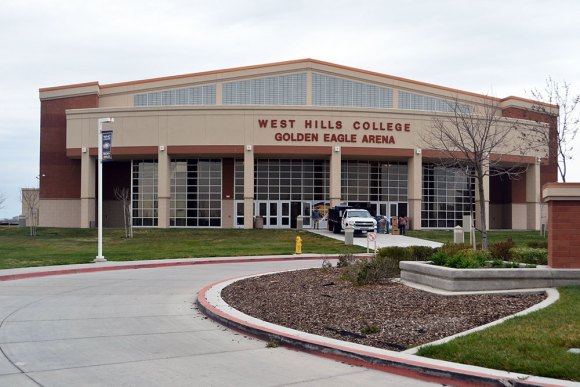West Hills College copes with the pandemic and thanks to innovation, continues to educate
A lone visitor riding his bike during a sizzling summer afternoon on campus might not see a single living soul. That's the coronavirus talking. But the students are on campus, virtually, and they continue to learn, many in the sanctity of their homes, but they're still learning and working towards a degree that ultimately will change their lives.
It's not that the virus has managed to scare students from campus – there are still students attending – but rather, like most schools in California and beyond, learning continues via online, something, it turns out, West Hills has been doing for years.
Learning goes on, just as it has for thousands of years. A pandemic will never end humanity's thirst for knowledge – it may slow it down a little while would-be learners cope with the latest "distance learning" tools, but the quest for knowledge will never subside.

"This is a very challenging time for anybody, and among the hardest situations our district has ever encountered, and particularly in my time as chancellor for the last four years," said West Hills College District Chancellor Stuart Van Horn.
Van Horn, from the relative comfort of his Coalinga district office, cited a litany of challenges faced by the public and students. He cited a laundry list of grievances any normal human being could very well do without, starting, of course, with the pandemic, the resulting financial crisis, and of course, a national focus on systemic racism via the George Floyd death at the hands of police officers.
Yep, this 2020 pandemic has just about all its bases covered.
However, while kindergartners and high school freshmen struggle with their version of "distance learning," West Hills College has developed a knack for online learning, providing students with online opportunities for quite some time. It's been a staple around these community college parts.
There was a time, well before Mr. COVID-19 showed up, that West Hills College, including Lemoore and Coalinga, were pivotal partners in the community. "We had a vibrant campus life at all of our sites. There were all kinds of activities. All employees were reporting to work. Our student clubs were active, and our intercollegiate athletics were active. Community groups would utilize our facilities, so yes, we were then the educational and cultural hub of the community," said Van Horn.
But when the virus forced schools to shut in the spring, everything changed.
"We had to pivot, from primarily on-ground instruction to primarily online instruction," said Van Horn. "We remained that way throughout the summer session. We did offer summer classes though it's not as many as in the winter and spring."
A typical summer schedule is 150 classes. This summer, the district averaged about 35 to 50 sections.
The state's budget also hit local schools and colleges hard. Budget reductions and the state's $54 billion deficit greatly impacted the college's expected revenue significantly. "We were expecting about a 25 percent reduction from the state, but May comes along, and the governor signs a budget which is heavily dependent upon deferrals, meaning you can take out a loan or use your reserves to provide that service now, but we'll reimburse you maybe later. That was a further hint particularly for our rural district, which doesn't have huge reserves."
Van Horn went on to say that WHC had to implement workforce reductions due to the pandemic and budget deferrals. A new funding formula cut West Hills' budget about $6 million less than expected. Then the pandemic came along, and the resulting recession reduced the college's funding.
"That's a challenge for any district, rural or urban. But it hit us particularly hard, and so we were faced with the unimaginable, and the governing board had to come with grips with reducing access to cut our costs."
Next came workforce reductions – layoffs. Salary freezes and furloughs became the norm for a while. The school's traditional commencement went by the wayside. Critical parts of the campus, including child development centers, were shuttered, and the district had to get creative with staffing, all a direct response to a cut in state funding.
"It has been extraordinarily difficult for everyone at West Hills because we have some incredible people that work in our district who are so committed to students' success. It was a very difficult period, and we're still in that difficult period. It's been a rough summer for our governing board. They had to make some very (difficult) decisions that they've never had to make before."
How did WHC deal with the pandemic? On the campus, spring went from on-ground to online.
Students and staff transitioned to an online mentality. Many colleges were not prepared for online. West Hills, thanks to a bit of forward-thinking a few years ago, was prepared.
"We pivoted from on-ground to online in 48 hours, and that is a direct result of an incredible leadership of our campuses and the incredible leadership of our faculty for the last three to four years," said Van Horn.
In the last four years, the local community college has embraced online learning, and when it was needed the most, West Hills was ready.
"About 30 of 100 courses we offer across the district each semester were online courses. Most community colleges it is 16 to 18 percent. We used online as fertile prospecting to grow demand," said Van Horn. "We were offering more online courses than most community colleges because we saw it as a strategy to grow demand and grow enrollment. And it did that. We grew enrollment by 19 percent between 2015 and 2019 as a direct result of our program diversification."
Because of our emphasis online, the transition to online was almost immediate, said Van Horn.
West Hills has been an innovator in community college education. For its efforts, the district has earned three national awards for innovation. WHC is an innovative college, from online learning to other opportunities given to students. Innovation is a hallmark at West Hills College District.
"I'm very optimistic that we will come out of this stronger and better," said Van Horn. "We'll look different, and we don't quite know what the future is going to look like two, three, five years from now, but we're extraordinarily proud of the work that we've done, and it's come with a lot of frustration and a lot of hardship. But that just suggests that we're not immune. Every company, every business, every industry is experiencing extraordinary hardship, and we're one of those."
The pandemic has cut into the district's enrollment, but not by much. In 2019 the school's fall semester counted 6,105 students enrolled in college classes. When school started again on August 17, the district counted 5,801 enrolled students.
With the health and safety of employees and students at stake, Van Horn and his staff are continually reassessing. "I've never had to leap through anything as complex as this. So, it has been a challenge. I've not been outworked, and I will consistently provide whatever effort I need to ensure our students and our faculty and staff are safe. We're doing everything we can to provide access to higher education opportunities and social mobility to so many of our district's disadvantaged citizens."
Local News
- Summer of fun, Second Annual Bash, held recently at Veterans Park for kids and adults
- Lemoore High grads celebrate another rite of passage as large class gives fond farewell to school years
- West Hills men's basketball team takes next step in NorCal basketball after impressive win against Delta College
- West Hills College Lemoore students earn STEM scholarships to study Biology, Engineering, Physics, and Math
- A Christmas tree tradition renews and Christmas Parade scheduled for Dec. 2
- Local volunteers and former teachers go the extra mile to spruce up and beautify Downtown Lemoore
_0.jpg)

.jpg)




